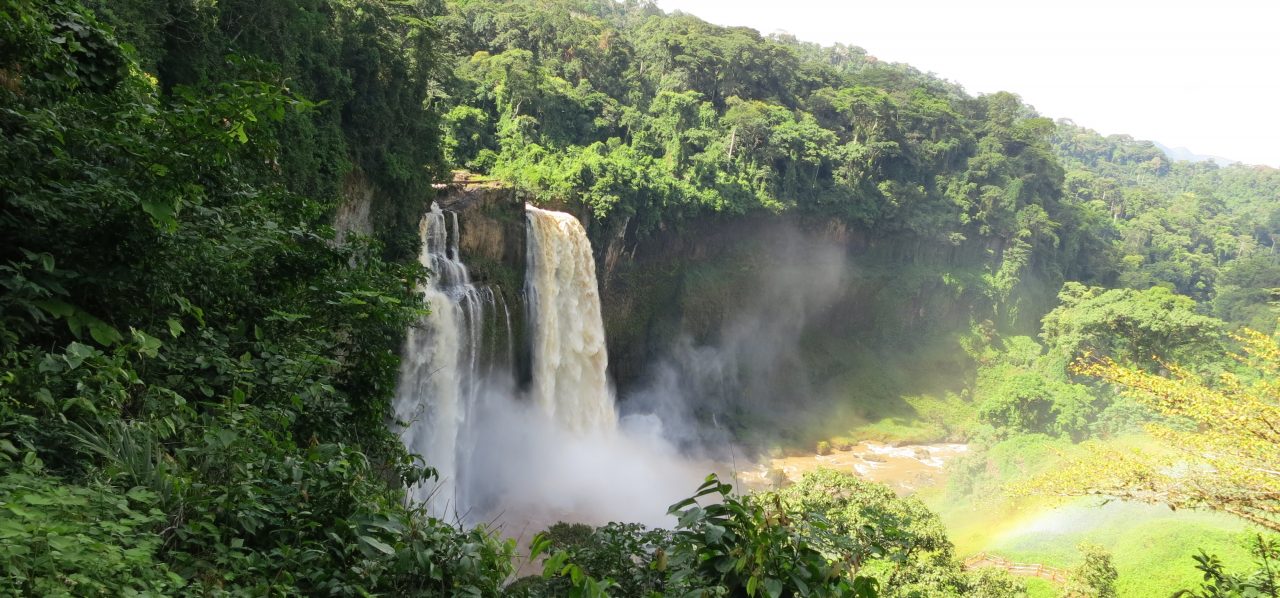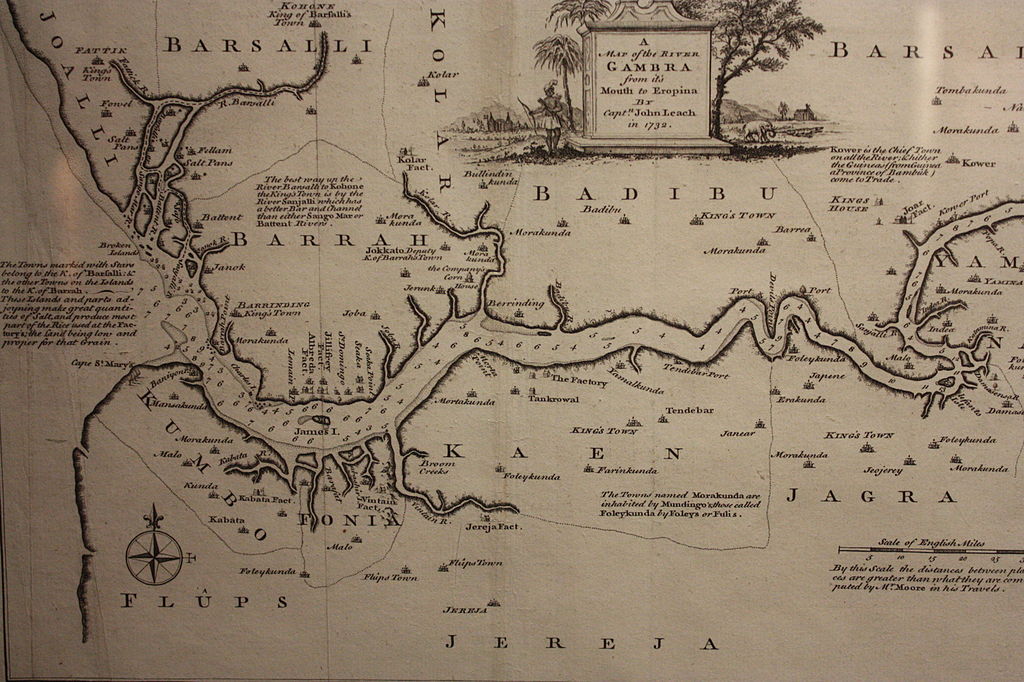As I read more colonial treaties signed on the continent, it is hard for a modern mind to understand the concept of ceding over rivers. How do you know where the river ends? Is the river part of just one kingdom? What do you do when it is split among several kingdoms? Did the Europeans take that into consideration, if they only had the signature from one king, and not others? Or did they just cause war to get the remainder of the river? What do you think?
Below is the example of the Gambia River.
On the 3rd September, 1783, a Treaty was concluded between Great Britain and France, by Article X of which the King of the French guaranteed to the King of Great Britain the possession of Fort James (Albreda) [located on modern-day Kunta Kinteh Island] and of the River Gambia.
====
Cession of the River Gambia to Great Britain. (The map of Africa by Treaty, Vol 1, P.367 – 368)
On the 15th June, 1826,+ a Convention was signed between the Acting Governor of Sierra Leone and the King of Barra and of the River Gambia, with his Chiefs and headmen, for the cession of the Gambia to Great Britain.
It contained the following stipulations:
* * *
“ 2nd. The said Brunay, King of Barra, by and with the advice and consent of his Chiefs and headmen before named, cedes, transfers, and makes over to his Honour Kenneth Macaulay, Acting Governor of Sierra Leone, and his successors, Governors of Sierra Leone for the time being, on the part and behalf of His Majesty the King of the United Kingdoms of Great Britain and Ireland, his heirs, and successors forever, the full, entire, free, and unlimited right, title, sovereignty; and possession of the River Gambia, with all the branches, creeks, inlets, and waters of the same, as they have been held and possessed by the Kings of Barra from time immemorial ; and the said Brunay, King of Barra, with the advice and consent of his said Chiefs and headmen as aforesaid, does further cede and forever relinquish all and every right, claim, or demand for customs or duties of any description on British or other vessels entering or navigating the River Gambia, or any of the waters thereof (as have been formerly demanded and taken).
+ S.P., vol. xlviii, p. 882; H.T., vol. xii, p. 5. See also Treaties, 6th January, 1832, p. 824, and 18th November, 1850, p. 326.




Signing over a river is just absurd. Just when I thought colonial treaties couldn’t get more insane, I’m proven wrong.
LikeLike
Yes… reading these treaties is quite mind-boggling!
LikeLiked by 1 person
It just makes no sense. How does one sign away a river? It’s as insane as trademarking mountains or non-English phrases like a certain company I know in the latter.
LikeLike
Right indeed!
LikeLiked by 1 person
Speaking about trademarking, did you hear that a British company named Timbuktu trademarked “Yoruba”? https://www.youtube.com/watch?v=7HRiM2StuS8
LikeLike
What the…? This is really annoying and unbelievable! Two white British men have a fashion brand called ‘Timbuktu’ and trademarked “Yoruba”… how is that even allowed for people to do that? Thanks for sharing… I am so glad that Nigerian brothers and sisters came together to have that stopped after finding out!
How on earth can someone (a foreigner) even trademark your identity? Thus winning royalty over your name, your identity, and barring you from using it? These trademark laws truly have to be reevaluated!
LikeLiked by 1 person
My jaw dropped when I found out about that story and I thought I would share it with you. This is mind-numbing that a white British-owned company named after a Malian city (their company name is most likely trademarked) and own the name of an entire African ethnic group and language. I still wonder how people can get away with this stuff. It’s the “Hakuna Matata” trademark all over again, but this time it’s about a whole ethnicity! It’s awesome that the Nigerian community decided to give Timbuktu that backlash. When I talked about this on my main blog, I noted that they’ve never done this to white ethnic group names (Ex: Irish, Italian, English, etc…). There should be limits as to what you can and can’t trademark. Keep in mind that Donald Trump himself couldn’t trademark the phrase “You’re fired” when The Apprentice was relevant or Paris Hilton not being able to trademark the phrase “That’s hot”, but companies can trademark common non-English phrases and a whole ethnicity? The fact that people can legally sue people for “using it the wrong way” or infringing upon an ethnic group name is infuriating.
LikeLike
Indeed, there should be limits to what people can and cannot trademark. If Donald Trump himself couldn’t trademark the phrase “You’re fired” when The Apprentice was relevant, why should companies be allowed to trademark common non-English phrases and a whole ethnicity? What on earth is that! So the same rules do not apply to other ethnicities?
LikeLiked by 1 person
THANK YOU! It’s awesome how there are people on WordPress who actually get how trademarking can go too far especially when one does so with common non-English phrases or even the names of entire cultures, tribes, languages, etc.
I remember that attempted trademark from Donald Trump over a decade before he was even thinking about being president. There was a news story I remember watching when I was in my early teens where there was a woman who owned a ceramics/pottery business (I think it was in Ohio, if I’m not mistaken) called “You’re Fired.” It works as a pun because you put clay in a kiln which is very hot and fiery on the inside before the ceramics can be sold hence they are “fired” in that sense instead of losing your job. In that news report, they explained trademark and IP laws where if Trump did try to trademark or at the very least copyright it around where the businesswoman was from, she could sue him and automatically win because it’s been around longer than The Apprentice.
You bring up such a good point when it comes to companies overstepping their boundaries. There are other examples like Jeep Cherokee, Pontiac cars (Pontiac is also a name of a Native American tribe), or Louis Vuitton having “luxury” Maasai clothes for sale. This is so bogus. I seriously wonder if it doesn’t apply to other ethnicites. Granted, I haven’t seen anyone try to trademark other phrases like “C’est la vie”, “Que sara sara”, or “Viva Mexico” for example and even Americans know what those phrases mean in English!
LikeLike
This is interesting information, and really makes me want to read more on these trademark laws. It sounds like trademark only applies to Westerners, and not other cultures; so there is easy cultural appropriation. Remember how Kim Kardashian was trying to trademark her brand of underwear ‘Kimono’, and it brought an uproar, to the point that she had to change it to skims? Just like you pointed the fact that no one can trademark “C’est la vie”, or “que sera sera”… There should be clear limits.
Thanks for reminding me about the Ottawa leader Pontiac; I have always been fascinated by his fierce combative spirit.
LikeLiked by 1 person
Sure thing. I’ve been researching a bit more after hearing about the “Hakuna Matata” case to really get into how that stuff works. Wow, I forgot about the Kimono scandal with Kim Kardashian. Not going to lie, I try to block out any news involving a Kardashian, but I remembered something about her clothing line, but I didn’t realize she was trying to trademark that word. Sure, the word that is loaned out in the English language from Japanese like ninja, sushi, or samurai, but that is still unacceptable. I’m glad there was enough backlash to change it to skims. There needs to be clearer standards like not trademarking foreign phrases (especially if they’re common ones) and names of ethnic groups/tribes, etc.
Sure thing. Glad I was able to remind you.
LikeLike
I would say “Take back your river!” Who are they to lay claim to your lands and rivers? The British and the French are the same mob; full of lies and trickery with their words. It is your country, your lands…you are the majority. Don’t let them dictate to you what is rightfully yours. You only have to look at history to see how they have stolen and plundered other indigenous peoples’ lands in the world, to know they are greedy liars who seek money and power. They will never see the error of their ways but their downfall is eminent!
LikeLiked by 1 person
Yes… loverofallthingsafrican2021, there is so much greed, and we need to take back what is ours!
LikeLiked by 1 person
Indeed!
LikeLiked by 1 person